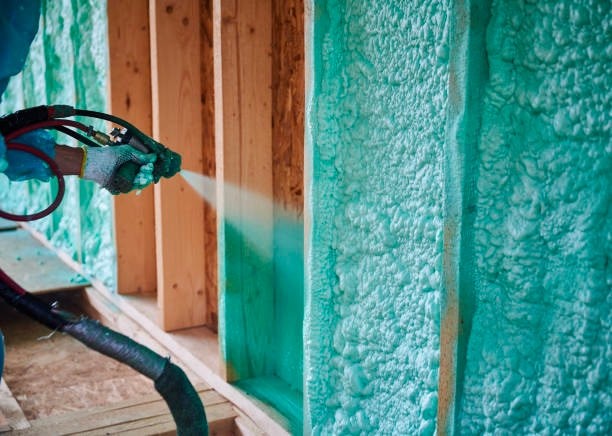How Does Spray Foam Insulation Work

Spray foam insulation is a popular choice for many homeowners and builders due to its ability to efficiently insulate spaces.
It is a type of insulation material that is applied as a liquid and then expands into a foam, creating an airtight seal. This can effectively reduce energy costs by preventing heat from escaping or entering the building.
But how exactly does spray foam insulation work? In this article, we will delve deeper into the science behind spray foam insulation and understand its benefits.
What Is Spray Foam Insulation?
Spray foam insulation is a two-component mixture consisting of Isocyanate and Polyol resin. When these two components are mixed in a specific ratio, they react and expand rapidly to create foam. This foam is then sprayed onto the desired surface using specialized spraying equipment.
The expansion properties of spray foam insulation make it an effective insulator as it expands and fills up any gaps, cracks or voids present in the walls or ceilings. It creates a seamless layer of insulation that is impermeable to air, moisture and sound.
There are two types of spray foam insulation – open-cell and closed-cell. Open-cell spray foam is less dense and allows for some air and moisture to pass through, while closed-cell spray foam is denser and acts as a complete barrier.
How Does Spray Foam Insulation Work?
Spray foam insulation works by creating an airtight seal around the area it is applied to. The foam expands and adheres to the surface, filling up any gaps or spaces that may exist. This results in a highly efficient insulating layer that can significantly reduce energy costs.
Spray foam insulation also has a high R-value, which measures its ability to resist heat flow. The higher the R-value, the better the insulation. Closed-cell spray foam has a higher R-value than open-cell spray foam, making it more effective at reducing heat transfer.
Additionally, spray foam insulation can also act as a sound barrier due to its density and impermeability to air and sound. This makes it a popular choice for buildings located in noisy areas or for homeowners who value peace and quiet.
Moreover, spray foam insulation is also resistant to moisture, making it an effective solution for preventing mold growth and water damage.
Benefits of Spray Foam Insulation
The most significant benefit of spray foam insulation is its ability to provide excellent thermal resistance. It can significantly reduce heating and cooling costs by creating a barrier between the interior and exterior environments.
Spray foam insulation is also known for its durability as it does not shrink, sag or settle over time. This ensures that the insulating properties remain intact for many years without needing replacement or maintenance.
Another advantage is its versatility. Spray foam insulation can be applied in various areas, including walls, ceilings, attics, and crawl spaces, making it a suitable option for both new constructions and retrofits.
Furthermore, spray foam insulation can also improve indoor air quality by minimizing the entry of allergens, dust, and pollutants into the building.
Does Spray Foam Insulation Have Any Disadvantages?
One disadvantage of spray foam insulation is its initial cost, which may be higher than traditional insulation materials. However, the long-term savings from energy costs and durability can offset this initial investment.
Another issue is that the installation of spray foam insulation requires professional equipment and expertise. DIY installation is not recommended as it can lead to improper mixing or application, resulting in reduced effectiveness.
Moreover, spray foam insulation contains chemicals that may emit odors during installation, but these fumes dissipate quickly once the foam has cured. Plus, there are now low VOC (volatile organic compounds) options available in the market.
Are There Any Alternatives to Spray Foam Insulation?
Yes, there are several alternatives to spray foam insulation that can be considered depending on your specific needs and preferences. Fiberglass insulation is a common choice, known for its cost-effectiveness and ease of installation. It consists of fine glass fibers and comes in batts or rolls that can be fitted between wall studs, joists, and beams.
Another alternative is cellulose insulation, which is made from recycled paper products treated with fire-retardant chemicals. It's an environmentally friendly option that can be blown into wall cavities, attics, and other hard-to-reach areas, providing good thermal performance and soundproofing.
Mineral wool or rock wool insulation is another option, offering excellent fire resistance and soundproofing qualities. It is manufactured from volcanic rock or recycled steel slag and can be used in various applications, much like fiberglass.
Rigid foam insulation panels, made from materials like polystyrene, polyisocyanurate, or polyurethane, provide high R-values and are suitable for insulating walls, roofs, and foundations. These panels are easy to install and offer a stable thermal barrier.
Lastly, natural insulation materials such as cotton, sheep's wool, and hemp are gaining popularity. These options are sustainable and environmentally friendly but may come at a higher cost compared to traditional materials.
Each of these alternatives has its own set of advantages and disadvantages, so it's essential to evaluate them based on factors like cost, thermal efficiency, ease of installation, and environmental impact.
How Much Spray Foam Insulation Do I Need?
The amount of spray foam insulation needed depends on the area that needs to be insulated, as well as the type and thickness of the foam being used. It is recommended to consult with a professional insulation contractor who can assess your specific needs and provide an accurate estimate.
Factors such as climate, building design, and energy efficiency goals also play a role in determining the amount of spray foam insulation required. A thicker layer of foam will provide a higher R-value and better insulation, but it may come at a higher cost.
In general, it is essential to ensure that all areas are adequately covered for maximum effectiveness. This includes walls, ceilings, roofs, and any gaps or cracks that may exist.
Regular maintenance and proper upkeep of the insulation are also crucial to ensure its long-term performance. This includes regular inspections for any signs of damage or wear, as well as addressing any areas that may need additional insulation over time.
Why A Professional Insulation Contractor is Important for Spray Foam Installation
While DIY projects may be tempting, installing spray foam insulation requires specialized equipment and expertise. A professional insulation contractor has the necessary training and experience to safely and effectively install spray foam insulation.
They can assess your specific needs and recommend the best type of foam, thickness, and application method for maximum efficiency. They also have access to high-quality materials that may not be available to the general public.
Moreover, a professional contractor will ensure that all safety protocols are followed during installation to protect both themselves and your property. Improper handling or mixing of chemicals used in spray foam insulation can lead to potential health hazards.
Lastly, hiring a professional insulation contractor can also provide peace of mind, knowing that the job is done correctly and will last for many years to come. They can also offer maintenance services or warranties to further ensure the longevity of your spray foam insulation.
How To Choose The Right Professional Insulation Contractor
When selecting a professional insulation contractor for your spray foam installation, it's essential to do your research and make an informed decision. Start by asking for recommendations from friends, family, or colleagues who may have had experience with insulation contractors.
Next, check the contractor's credentials and certifications to ensure they are qualified and knowledgeable in spray foam installation. It's also a good idea to ask for references and check online reviews to get a sense of their reputation and quality of work.
Consider obtaining multiple quotes from different contractors to compare prices and services offered. However, keep in mind that the cheapest option may not always be the best choice when it comes to quality and expertise.
It's also important to communicate your needs and expectations clearly with the contractor before hiring them. This will help ensure that both parties are on the same page and avoid any misunderstandings or issues during the installation process.
How Much Does Spray Foam Insulation Cost?
The cost of spray foam insulation can vary depending on factors such as the type and thickness of foam used, the area that needs to be insulated, and labor costs. On average, spray foam insulation can range from $1.50 to $3 per square foot.
While this may seem like a significant investment upfront, the long-term benefits of spray foam insulation can outweigh the initial cost. It provides excellent thermal performance, reducing energy consumption and utility bills over time.
Additionally, spray foam insulation is known for its durability and longevity, with some materials lasting up to 80 years. This means you won't have to worry about replacing or repairing your insulation soon.
It's important to note that while spray foam insulation may have a higher upfront cost compared to other insulation materials, it can also provide significant savings in the long run. This is due to its high R-value and ability to create an airtight seal, reducing energy waste and increasing the overall efficiency of your home or building.
Choose Koala Insulation for Your Spray Foam Insulation Needs
At Koala Insulation of Greater Charlotte, our team of insulation experts is dedicated to providing top-quality service and products to our customers. We understand the importance of having a well-insulated home or building, both for comfort and cost efficiency.
Our spray foam insulation services are designed to meet your specific needs and ensure maximum effectiveness. We offer competitive pricing, multiple insulation options, and a commitment to customer satisfaction. Plus, with our clean and efficient one-day installation process, you won't have to worry about any disruption or mess in your home or business.
So call us at (704) 558-3107 or schedule a free estimate online today and let us show you the many benefits of upgrading your insulation with Koala Insulation. From increased comfort to lower energy bills, we've got you covered!
FAQs
How does spray polyurethane foam prevent air leakage?
Spray polyurethane foam expands upon application, filling gaps and cracks to create an airtight seal. This prevents air leakage by sealing off areas where air could escape, making your home more energy-efficient.
What is the difference between open-cell foam and closed-cell spray foam insulation?
Open-cell foam is lighter and more flexible, ideal for interior spaces, while closed-cell spray foam insulation is denser and provides a stronger barrier against air leakage and moisture. Both types of spray foam insulation offer excellent insulation benefits.
How does spray foam insulation reduce conductive heat transfer?
Spray foam insulation reduces conductive heat transfer by creating a barrier that blocks heat from moving through walls, ceilings, and floors. Polyurethane foam insulation works by expanding and filling spaces, preventing heat loss or gain.
What types of heat transfer does spray polyurethane foam insulation address?
Spray polyurethane foam insulation addresses both conductive heat transfer and radiant heat transfer. Spray foams create an effective barrier, preventing heat from passing through surfaces and improving overall energy efficiency.
Conclusion
In conclusion, spray foam insulation is an excellent choice for those looking to improve their home or building's energy efficiency and comfort. Hiring a professional insulation contractor, such as Koala Insulation, is crucial to ensure the proper installation and long-term performance of this type of insulation.
Remember to do your research when choosing a contractor and communicate your needs. While spray foam insulation may have a higher upfront cost, its long-term benefits make it a worthwhile investment.
So don't wait any longer – schedule a free estimate with Koala Insulation today and start reaping the rewards of upgraded insulation!
Find Your Location


Get a quote


